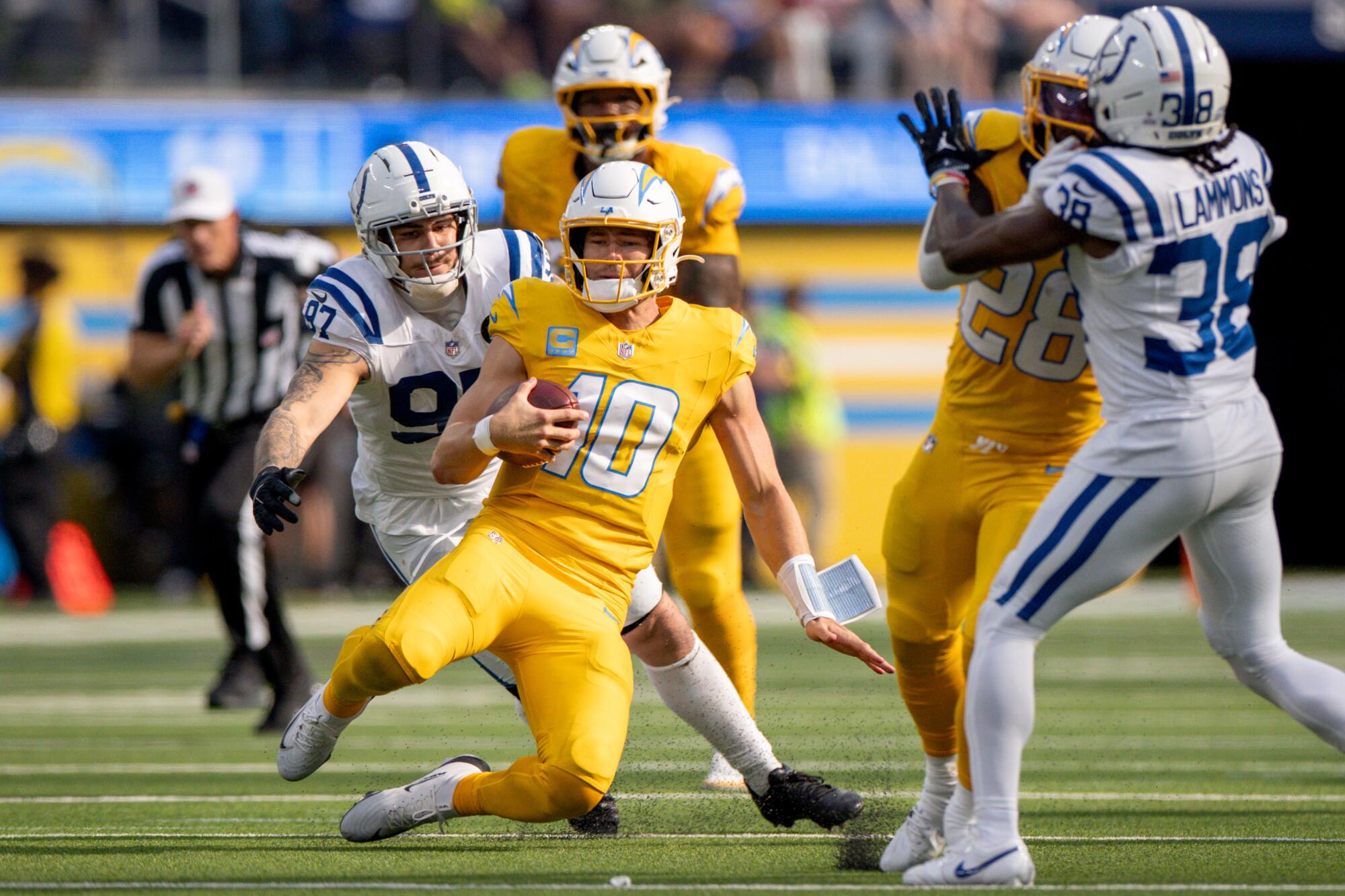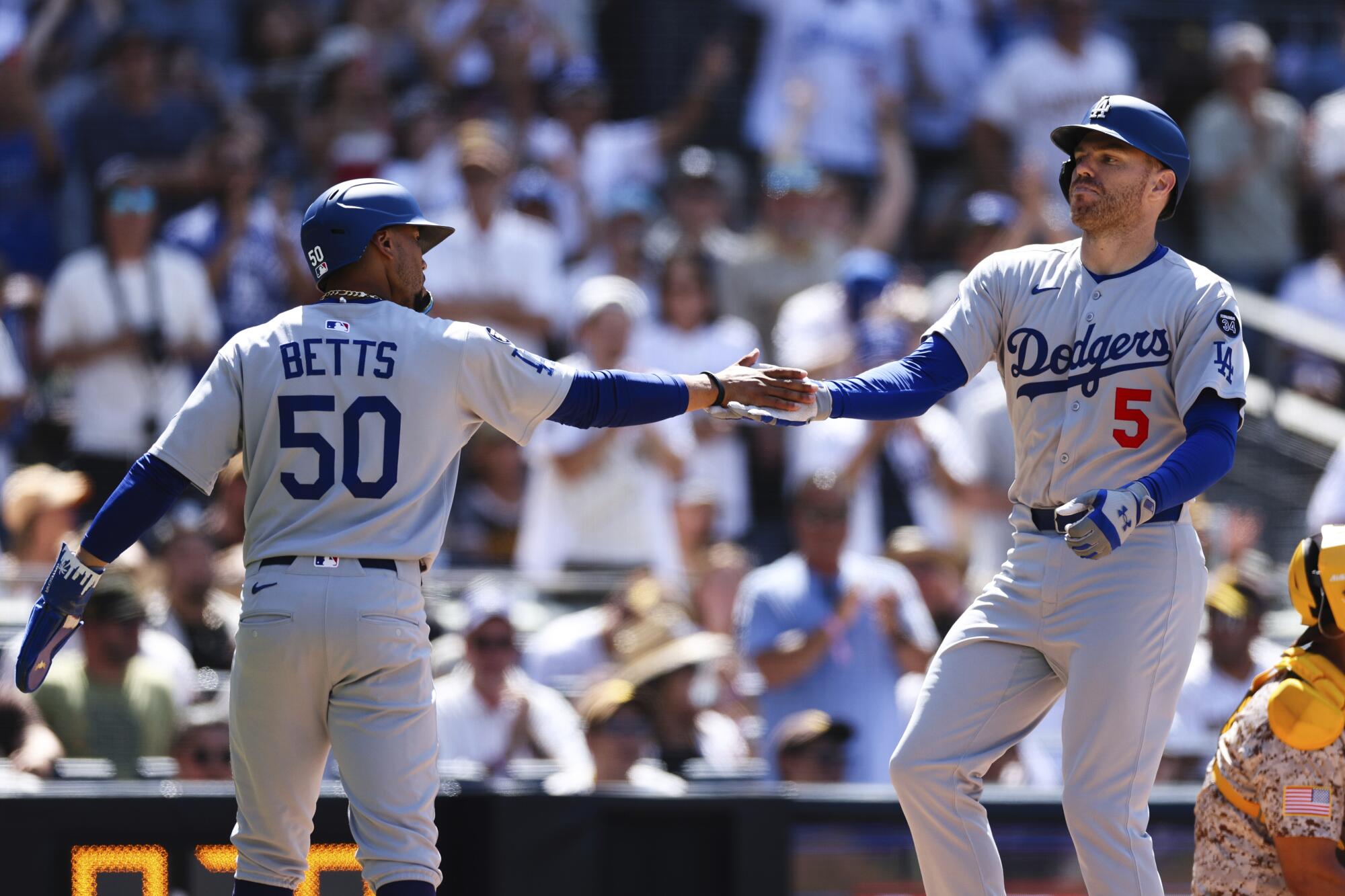Chargers trampled by leading rusher Jonathan Taylor in loss to Colts
The Chargers had the look. All-gold uniforms. Retro logos. Powder-blue end zones with script from the nostalgic days of Dan Fouts and Don Coryell.
But their defense?
As dead as disco when it counted most.
Indianapolis Colts running back Jonathan Taylor, the NFL’s leading rusher, trampled the Chargers on Sunday with touchdowns of 23, eight and 19 yards in a 38-24 victory at SoFi Stadium.
It was just another Sunday for Taylor, who came into Week 7 leading the league in rushing yards and touchdowns, and averaged 5.9 yards per carry against a Chargers defense that had been respectable to this point. That defense allowed an average of 20.8 points in the six previous games.
That helped open the passing lanes for Colts quarterback Daniel Jones, who threw a pair of touchdowns and again made an early-season case for Comeback Player of the Year after his career had seemingly flamed out with the New York Giants.
It was the second trip to Los Angeles in four weeks for the Colts, who lost to the Rams here in Week 4. They got better on both sides of the ball but couldn’t fully atone for their ineffectiveness in the first half.
The Chargers, whose distinctive look was a nod to the 1970s, were sleepwalking in the first half before coming to life in the second.
Justin Herbert kept the home team somewhat in the game with three touchdown passes after halftime but found himself trying to dig out of a deep hole all day.
The Chargers actually outgained the Colts, 445 yards to 401, and held the ball for nine minutes longer, but Indianapolis was more efficient with its possessions, better in the red zone, and took advantage of its opportunities.
Chargers quarterback Justin Herbert slides while scrambling during the second half Sunday.
(Eric Thayer / Los Angeles Times)
Herbert saw two of his passes intercepted in the first half. The first was batted high in the air at the line of scrimmage and plucked by 314-pound defensive tackle Grover Stewart. The second pick came in the red zone, when safety Nick Cross slipped in front of Quentin Johnston in the end zone to intercept an eight-yard pass.
The Chargers, who trailed at halftime, 23-3, clawed their way back into the game with touchdown passes to Johnston, Keenan Allen and Oronde Gadsden II.
Such a rollercoaster of a season for the Chargers, who ran the table against the AFC West in the first three weeks, then lost back-to-back games to the Giants and Washington Commanders, before rebounding with a come-from-behind win at Miami.
There’s not much bounce-back time after Sunday’s loss as the Chargers play host to Minnesota on Thursday night.
The Chargers can take solace in that no one is running away with the division. Kansas City stomped Las Vegas on Sunday, 31-0, but the Chiefs aren’t as dominant as in recent years. And Denver lost to the Chargers on the road and still looks to be finding its way.
Colts linebacker Zaire Franklin breaks up a pass intended for Chargers wide receiver Ladd McConkey in the end zone during the fourth quarter Sunday.
(Eric Thayer / Los Angeles Times)
Against the Colts, the troubles began early for the Chargers. After the home team’s first snap, Chargers left tackle Austin Deculus lay face down on the turf. He was the team’s fourth player to line up as Herbert’s blindside protector.
It was an ankle injury that felled Deculus — he wound up returning in the second quarter with a bulky brace — and the Chargers turned to the lightly experienced Foster Sarell, who suddenly held one of the most important positions on the field.
Just more offensive line insanity for the Chargers, who have cycled through six tackles so far. Their line was once considered an area of strength.

